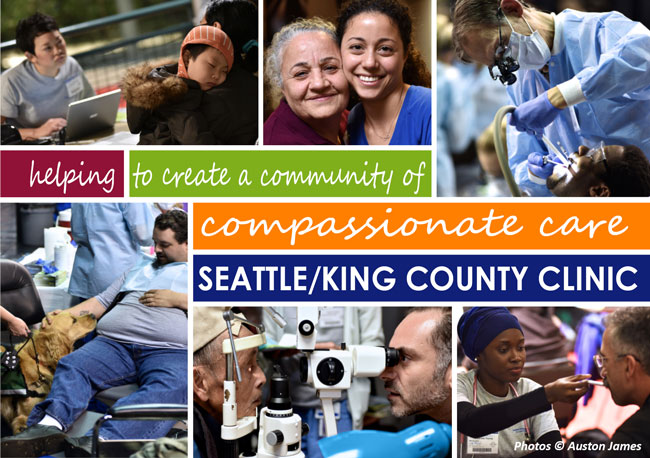Runta News-Seattle
As Seattle/King County Clinic prepares to open its doors for a sixth year at Seattle Center, Feb. 13 – 16, 2020, organizers have an ambitious goal of recruiting 1,000 volunteers for each of the four days of this immense undertaking. Their hope is to provide over $2.5 million in dental, vision and medical services free of charge to people in need. KeyArena was home to the Clinic in its first five years of operation. Although Arena construction put the fate of the Clinic in doubt, the community rallied to make it happen.
“When the New Arena at Seattle Center was announced, people were elated. That was immediately followed by calls asking what that meant for the Clinic and pleas to keep it going,” said Seattle/King County Clinic Director Julia Colson. “Finding a temporary home for something of this scale and complexity is challenging. We explored numerous options and were about to give up when we discovered one week of potential availability in five Seattle Center facilities. By a stroke of luck, all of the healthcare equipment was also available. So, thanks to the tenacity, flexibility and efforts of many, we are holding a sixth Clinic.”
Still, Colson is tempering her excitement as she considers new challenges ahead, “Volunteer and patient recruitment is paramount given the different time of year and temporary location. We can’t assume people are aware the Clinic is still operating. Plus, the number of volunteers we have will determine how many patients we can serve. We have to get the word out!”
The Clinic needs healthcare professionals and general support volunteers to fill a broad range of functions and shifts. It also seeks volunteers for the days before and after the four-day event to help with preparation and wrap-up. Volunteers must be at least 18 years of age. Individuals may register at seattlecenter.org/volunteers.
Seattle/King County Clinic is the largest event of its kind in the State of Washington. Produced in partnership with more than 100 healthcare organizations, civic agencies, nonprofits and private businesses, the Clinic brings together thousands of volunteers and the organizing and event expertise of Seattle Center to address acute health issues among people who routinely face barriers getting the care they need.
Since the Clinic’s inception in 2014, more than 17,900 volunteers have participated. Clinic outcomes speak to the accomplishments of this immense effort in responding to a profound need in our community for accessible and affordable healthcare. Patients can receive a variety of services ranging from dental fillings and extractions, eye examinations, physicals, behavioral healthcare and social work to prescription eyeglasses, immunizations, laboratory tests, mammograms, ultrasounds and x-rays.
“At a time when so many in our region struggle to meet basic needs, Seattle/King County Clinic is a beacon of caring and generosity,” says Christine Lindquist, Executive Director of Washington Healthcare Access Alliance. “Seattle/King County Clinic provides immediate dental, vision and medical care, and connects patients to resources beyond the clinic walls. It also demonstrates the good we can accomplish when we work together as diverse partners to serve others and affect change.”
In its first five years, the Clinic provided $17 million in direct services to 20,000 patients who came from over 260 unique zip codes and spoke more than 50 primary languages. Clinic patients are parents, children, elders, veterans, immigrants, refugees, people living homeless and, in large part, wage-earners who struggle with the high cost of living.
As one volunteer described, “I was truly surprised to see that people seeking services were just like me, my family, my co-workers and neighbors. That was the biggest realization for me; folks who desperately need these services aren’t ‘them,’ they’re ‘us.’”
The commitment to produce an event of this magnitude represents the serious dedication of a caring community to address healthcare issues at the local level, to make a difference for those who struggle to access and afford care, and to raise awareness about who is left out of the current healthcare system.









